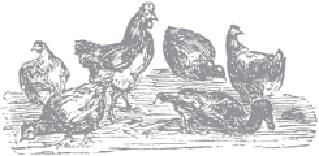Agriculture Reference
In-Depth Information
26
Dealing with Predators
MANAGING PREDATORS MAY BE THE
single most challenging — and frustrating — task
for the beginning poultry raiser. Although some regions of North America require greater
vigilance, you must be on guard against hungry predators constantly wherever you live.
This doesn't mean your flock will be wiped out the instant you become distracted; you
simply have to take precautions.
Who's Out There?
To be proactive, familiarize yourself with native predators — domestic and wild — and
any animals of particular concern in your neighborhood. Once you have researched what
animals live in your area, you must develop a plan to outwit these creatures waiting to
feast upon your fowl. In this chapter, you'll find descriptions of the more common pred-
ators of poultry. This list is not complete, but it will give you some idea of what to watch
out for and prepare yourself for. Also included are some basic methods of protection for
your flock.
Domesticated Animals
Sometimes your poultry flock's worst enemy are the very creatures you've kept as pets
or working animals around the farm.
House Cats
Cats love birds. It is simply a part of their nature. However, you needn't worry excess-
ively that your birds will be attacked if you train your cats to stay away from them. I have
had farm cats and poultry all my life without problems, except on the rarest of occasions.
My cats are trained to live peacefully with their poultry, and you can train your own cats
to respect your limits (see box,
page 400
). On the other hand, stray and feral cats emer-
ging from woods and thickets can cause you, your baby chicks, and even some grown

